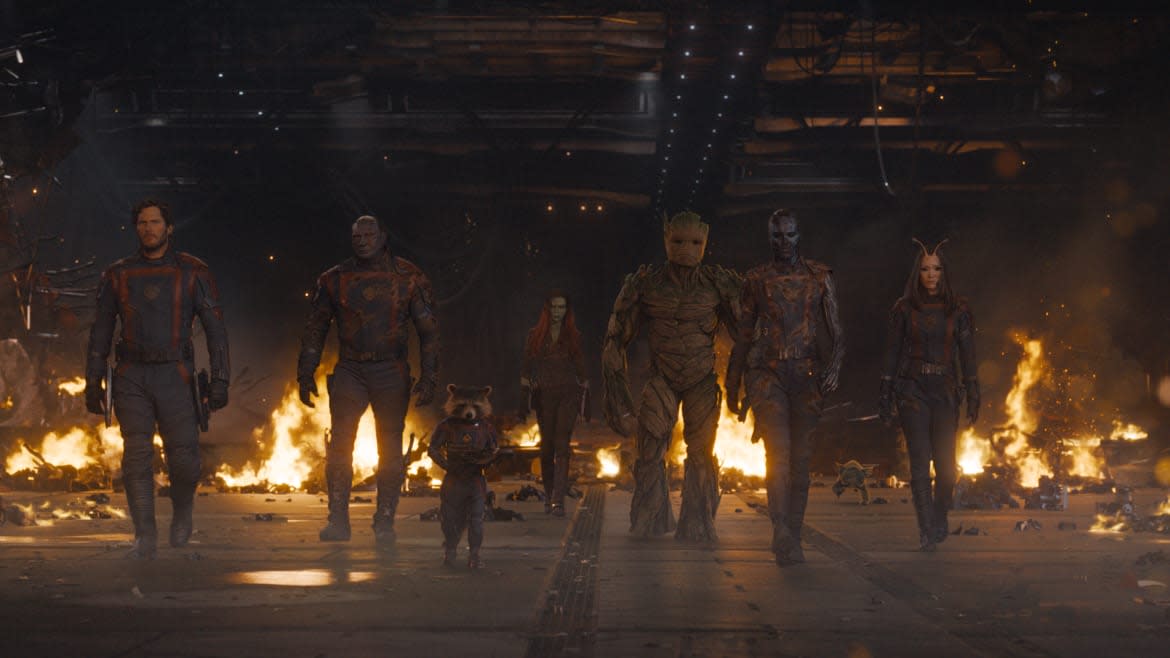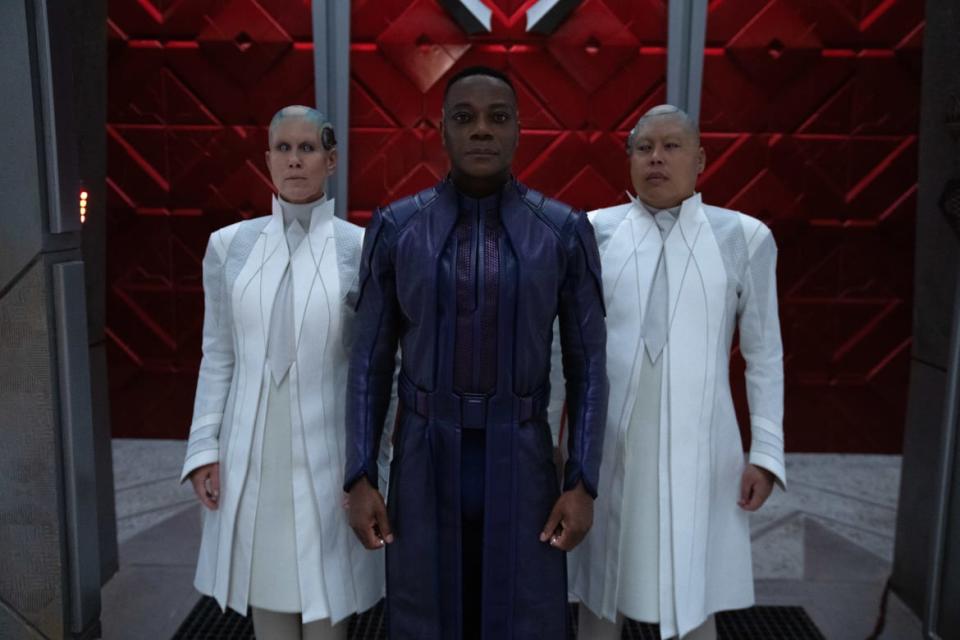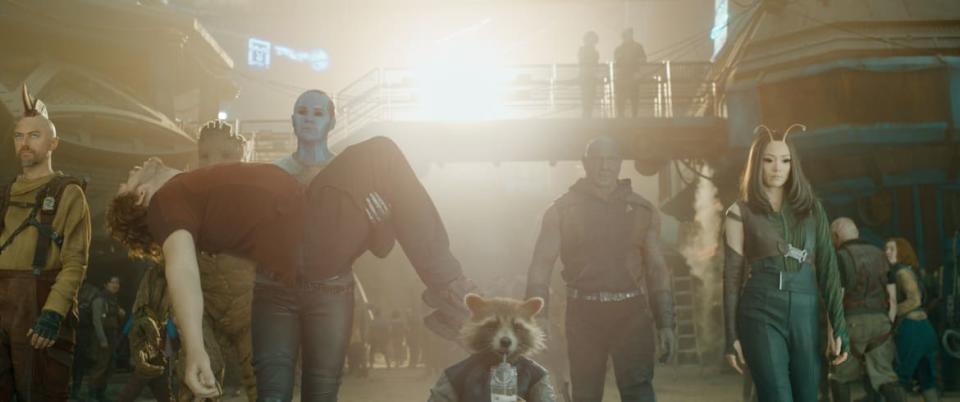‘Guardians of the Galaxy 3’ Has a Lesson for the MCU—but Will It Listen?

- Oops!Something went wrong.Please try again later.
- Oops!Something went wrong.Please try again later.
Growing up, I absolutely loved superheroes. I don’t know what kind of person I’d be without the ’90s X-Men and Spider-Man cartoons. I had a swath of superhero action figures that I’d stage epic battles with, filled with unnecessarily complicated backstories and motivations. (I was really cool, okay?) And I devoured comic books, eagerly anticipating a new issue featuring my favorite heroes duking it out each week. When my beloved spandex-clad legends made their way into the cinema, I was in heaven. My wildest dreams were coming true: The heroes I adored were lighting it up on the big screen in spectacular, live-action fashion.
But everything changed with the release of Iron Man in 2008, the kickoff for what would become the Hollywood version of my own superhero action figure-crossover adventures: the Marvel Cinematic Universe. At first it was exciting, but 15 years later, the MCU’s become enormous and untenable. There are 32 entries now, and that doesn’t even account for countless TV series—plus there’s now the entire DC universe to keep up with on top of it. In the four years since Avengers: Endgame alone, the MCU has expanded by 10 films. What felt so incredibly thrilling at first has become completely, utterly exhausting. Worse, I think that even the most die-hard defenders of the MCU would agree that almost none of these releases has recaptured the universe’s undeniable, exciting spirit. Instead, we’re now treated to inert, overcomplicated plots, weak effects, and an over-reliance on green-screen footage and the color gray.
After hitting its nadir with the cosmically embarrassing Ant-Man and the Wasp: Quantumania earlier this year, it became evident that the MCU had lost its ways. But the franchise’s 32nd entry, Guardians of the Galaxy Vol. 3, challenges that new conception: It’s absolutely fantastic. As the last film in the MCU canon to be directed by auteur James Gunn, who’s now running things over at rival DC’s film division, Guardians 3 is bold, emotional, funny, and action-packed. Most importantly, the devil’s in the details: Everything Marvel needs to get back on track and to evolve into something greater is within the blueprint of this film—if the studio is willing to listen. The secrets to the biggest franchise in cinema’s success largely lie within Galaxy 3’s bold character choices, especially its unique supervillain.
(Spoilers for Guardians 3 ahead.)
Finally: ‘Guardians of the Galaxy Vol. 3’ Is the Best Marvel Movie in Years
Guardians 3 offers one of the most remarkable MCU villains to date—a low bar, considering how two-dimensional most Marvel baddies are. But the High Evolutionary, played by Chukwudi Iwuji, carries a compelling, intimidating, Shakespearean heft to him. Seen largely through flashbacks at first, the Evolutionary is on an experimental quest to create the “perfect” new species, to be part of a supposedly harmonious new world. He’s developed a bond with one of his creations, who we viewers know as Rocket (voiced by Bradley Cooper as an adult and Sean Gunn as a tyke)—though the Evolutionary only refers to this little raccoon by his test subject number, 89P13, in order to maintain a sense of distance.
A man that initially seems like a friend to animals, invested in the good of all kinds, quickly reveals himself to be one of the nastiest villains in recent memory, MCU or otherwise. The deeply unsympathetic High Evolutionary is all about perfection, and he will do absolutely anything to achieve it, including obliterating anything or anyone he deems to be imperfect. For young Rocket, that means all of his other animal friends—and himself, a death sentence he traumatically evaded.
Years later, the Guardians must find the High Evolutionary in order to save Rocket, who will die if the crew can’t figure out how to work around the kill switch that was implanted within his heart. To do so, they wind up in the Evolutionary’s perfect world. It seems like a suburban haven, with creatures of all different species living alongside each other in seeming harmony; the candy-coated aesthetic of his life’s work made manifest looks like an indisputable dream. But when the Guardians see more of this planet, it becomes clear that the Evolutionary’s supposedly spotless creation is every bit as messy as Earth itself.

The Evolutionary’s obsession with rebuilding over and over in pursuit of perfection isn’t just a fascinating motivation—it’s a powerful metaphor for the MCU as a whole. Just like the Guardians villain, Marvel is obsessed with creating a foolproof formula, one that the studio’s box office receipts suggest that it’s found. Because of this, we get variations of the same movie every year, albeit with new characters each time. Unsurprisingly, it’s gone from an exhilarating novelty to a tiresome obligation.
What makes Guardians 3 so thrilling is how it actually breaks from these traditions in every way, and I wouldn’t be surprised if the High Evolutionary’s motivations mirroring that of the studio was a very deliberate (and clever) storytelling choice by Gunn. Now that it’s stumbled upon seeming perfection, MCU is afraid to make big changes, recycling the same stories over and over, giving them a new cosmetic shine, and passing them off as new movies. When the High Evolutionary achieved his similar goal, he too began to mass-produce (and torture) his creations ad infinitum, with few tweaks or creativity.
One of the reasons why both Gunn and viewers are so critical of the repetitive creation process is that it stems from fear. In Marvel’s case, the studio is afraid of letting characters exit the MCU entirely. For example: Even after Captain America had a perfectly grace note at the end of Endgame, we have a new Captain America in the works.
Marvel, Please Don’t Make Another ‘Guardians of the Galaxy’
The Marvel Comics catalog is absolutely mammoth, and there are infinite opportunities to tackle characters most people haven’t even heard of—that’s how we got Guardians of the Galaxy in the first place! But instead of again plumbing the comic book depths, we got a third Ant-Man. Did anyone on Earth, outside of Marvel executives, ever feel the need for more big-screen Ant-Man stories? I can’t imagine it.
Guardians 3 eschews this comfort by making a supporting character take a leading role in this, the big third (and possibly final?) entry in this story arc. The fuzzy little gunslinger Rocket takes the lead here, an odd but moving choice. He’s generally been treated as an oddity in the comics as well; he made his debut in 1976, but besides a four-issue miniseries in 1985, Rocket’s rarely been given much of a chance on-page or on-screen to have a solo adventure, away from the rest of the Guardians. Even his appearance in the fantastic 2011 video game Marvel vs. Capcom 3 was a surprise, though that franchise is well-known for including plenty of Marvel deep-cuts in its playable character roster.
While Rocket’s popularity has been on the rise, that’s largely because of Gunn’s trilogy, where Rocket has remained yet another beloved member of the team—until now. Guardians 3 has been billed as a goodbye to this lovable group of misfits long before its May 5 premiere, but I don’t think anyone could have predicted that the foul-mouthed raccoon would take center stage in such an unlikely, dramatic fashion.

Guardians 3 pivots the entire journey around Rocket, alternating between scenes from how he survives horrific childhood and his friends' adventure to get revenge on Rocket’s abuser, the High Evolutionary, in the present day. The result is that Gunn’s final Marvel film feels like a breath of fresh air. On top of its surprising character choices and effective villain, both as a metaphor and an antagonist, the film is Marvel’s most successful attempt at staging a comic book come to life in ages: The fight scenes are coherent, thrilling, and colorful, regularly verging into the batshit-wild, which is a wonderful thing. The sets look like real places, a far cry from the crippling instances of green screen as of late, and colors are back in a big way. Heck, there’s even a very funny and surprising use of the word “fuck,” the first time the F-bomb has been dropped in the MCU.
Thanks to Gunn’s vision and willingness to forgo the status quo in numerous ways, a strange little character like Rocket starred in one of the greatest stories the MCU has told. It’s the exciting kind of risk that most MCU movies are so deeply averse to making. Guardians 3 shows that it’s not only exciting to take risks, but it’s also necessary, especially for a film franchise that’s become too comfortable upon its laurels.
The MCU needs to learn from the High Evolutionary’s fatal follies and stop chasing perfection. The films are becoming overfamiliar, and while there have been some recent attempts at doing something different—namely Black Panther: Wakanda Forever and (the widely panned) Eternals—those tepid steps away from the standard storytelling structures are more fascinating failures than great comic book movies.
Dammit, James Gunn Is Getting Me Hyped for DC Movies Again
Now that James Gunn is done with the MCU, you better believe he’s taking his propensity for bold, risk-taking moves to the DCEU. If Marvel doesn’t want to get left behind, it shouldn’t let these stylistic swings leave with Gunn; the studio should use Guardians as a blueprint for its future. It’s time to find more exciting, unexpected characters to focus on, using them to push creative boundaries and deliver emotional, action-packed stories. Otherwise, DC may end up having the last laugh, and the MCU may end up the same way that the High Evolutionary did: done for.
Get the Daily Beast's biggest scoops and scandals delivered right to your inbox. Sign up now.
Stay informed and gain unlimited access to the Daily Beast's unmatched reporting. Subscribe now.

